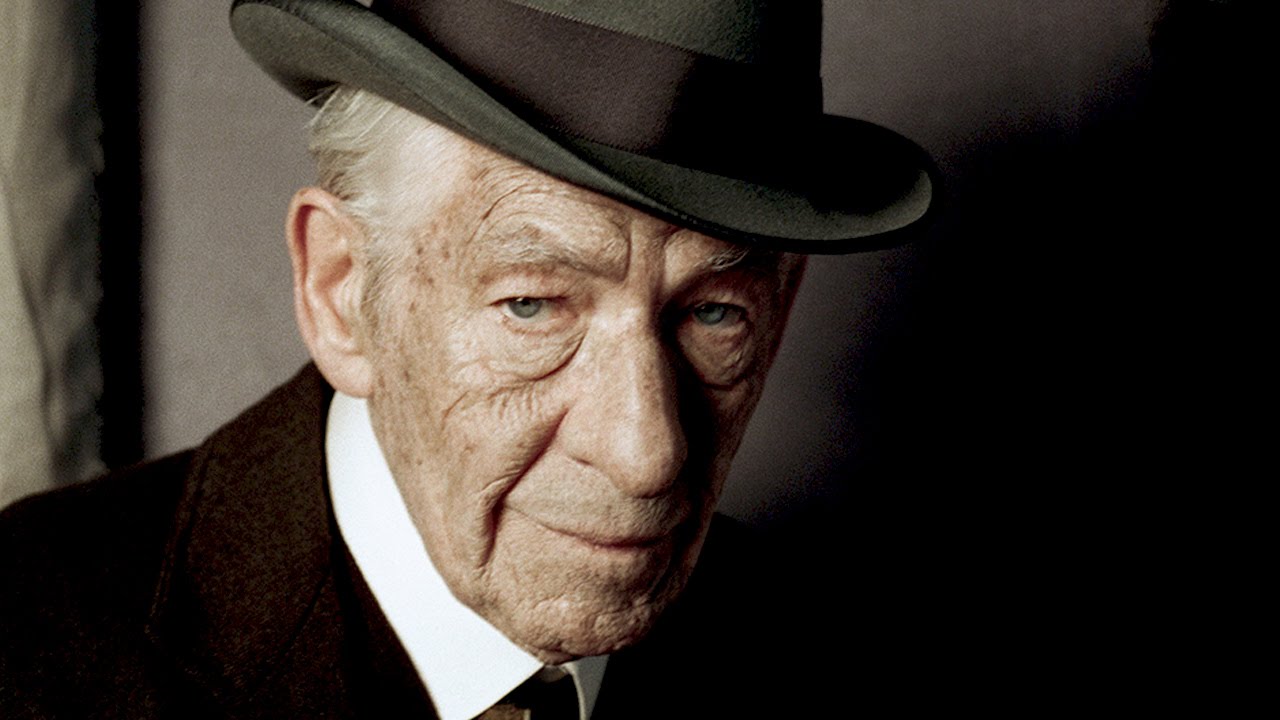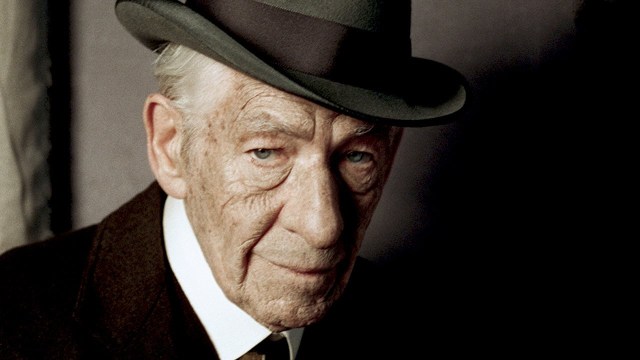Review: Mr. Holmes Triangulates the Mysterious End of Sherlock Holmes

Years and years ago, there was a TV movie called Mark Twain and Me, the true story of a girl who befriended Mark Twain in his old age. This movie, like a lot of Disney’s Canadian theatrical-to-TV movies, was taped, made it into my VHS library, and was regularly rewatched with my sister. I haven’t seen Mark Twain and Me in a very, very long time, but what I remember about it (I have to find a copy) is really liking it because it was a film which hit that sweet spot of being a true family film which did not pander to kids or throw in random risqué humor just to appeal to adults. This was a genuine piece of family entertainment, and even then was so rare, stood out.
Well, pretty early into Mr. Holmes, I started to feel all warm and fuzzy—remembering Mark Twain and Me—and thought “this is going to be an easy watch.” And it is a pretty easy watch. It’s also a sweet, charming, family-friendly movie that adults will actually want to see with their kids; not just a tolerable film adults will be willing to sit through. I don’t know why it is, but unlike American “family films,” England really has a much better idea of the difference between family films and children’s films. Paddington was a delightful surprise earlier this year, and although corny (it even has a pretty corny title), What We Did on Our Holiday is definitely a family film that lacks that all-too-common fringe-factor. But Mr. Holmes is definitely a step above, and a lot of that is rightly owed to Ian McKellen.
It’s almost amazing to think that it took McKellen this long to play the great detective Sherlock Holmes, but the wait has been well worth it. He nails a re-interpretation of the character, without throwing away the “classic” elements. What he instead does is latch onto one of the themes that’s been true of the character: a certain inability to relate to others despite his uncanny ability to see through them. And while recent interpretations have shown him to be cocky and socially unaware, McKellen leans into the melancholy about the character. In his old age, the emotional inadequacies he once saw as part of his gift are now a curse, and he has retired to his country to right some wrongs before his house fails him.
We don’t have much Dr. Watson in this version (he appears in brief moments, almost like a shadowy memory). But instead, we have a younger actor named Milo Parker as Roger, the son of Sherlock’s housekeeper (Laura Linney). Roger is, like Sherlock, very smart—almost too smart for the life of servitude he’s been born into—a life coming to an end considering the film takes place in 1947. Roger is taken under Mr. Holmes’ wing, teaching him to care for his beehives, and allows him to read his first attempt to write a “Sherlock Mystery.” Roger knows the rules of Sherlock’s mysteries and how he deduces clues. However, this is not a novel but a retelling of the true story of his failed last case, which involves a couple who lost two children during pregnancy. Patrick Kennedy plays husband Thomas, who believes his wife Ann (Hattie Morahan) has begun practicing witchcraft.
There is also a third story, sandwiched between these two main narratives, that involves Hiroyuki Sanada’s character Tamiki Umezaki, who brings Sherlock to Japan just after the bombing of Hiroshima to find a plant supposedly good for aiding memory. At times, I thought this specific story didn’t work with the other two but later realized that director Bill Condon and writer Jeffrey Hatcher (based on Mitch Cullin’s novel) have been very intentional in making the film revolve around three stories with three main characters in each, and each will eventually come together and circle back to Holmes’ sense of loneness—in a way. It uses a similar structure that the film and novel The Hours had, and this film uses it to punctuate its themes.
I’ve really liked Bill Condon’s movies in the past, particularly Gods and Monsters and Kinsey. His last film, The Fifth Estate, was a bit of disappointment, as was Twilight: Breaking Dawn. But Mr. Holmes is definitely a return to form, with Condon returning to characters he has deep empathy for because of the lonely lives they lead, despite the excellence of their work. Sherlock has never been treated with so much sympathy on screen, and yet somehow, Mr. Holmes never feels heavy-handed. A big part of this is McKellen and Condon’s professional relationship: McKellen starred in Gods and Monsters, and there are similarities to both characters.
But it’s also because of how good newcomer Milo Parker is and the depth Hattie Morahan brings to her role. Parker is definitely a find, as a child actor who is funny, clever, and even a little weird, but far from precocious or too sweet. I’ve always liked Morahan since she broke out in 2008’s mini-series of Sense & Sensibility and the film The Bank Job (two roles which couldn’t have been more different). And here again, she is excellent as a woman overcome by grief. Her scene with McKellen is probably the highlight in the film, and alters the tone (in a good way) of the entire second half to make everything seem less nostalgic and more melancholy.
Condon is pretty much unapologetic in making this movie a nice, pretty, British film. London and the Sussex village home look picturesque, and even the recreation of the fallout at Hiroshima is a bit tame, almost as if the film were made in ’50s Hollywood. Part of me feels showing that version is a bit disrespectful, but it’s a very brief moment that ends up have a larger, thematic purpose. And even so, there is real emotion in those scenes about grief and family, which allows the film to overcome any of those problems.
While I say this is a “family film,” it might be a bit much for kids under the age of eight, but kids older (or kids mature enough to deal with some real tragedy) will probably be fine, especially if you need a movie for kids, parents, and grandparents (this is the perfect grandparent movie). At under 2 hours, it moves along at a pleasant, brisk pace, despite being a very patient story. It may not be the Sherlock Holmes that Sir. Arthur Conan Doyle created, but it is a respectful twist on the classic detective for new and old fans which turns out to be a crowd-pleaser.
Lesley Coffin is a New York transplant from the midwest. She is the New York-based writer/podcast editor for Filmoria and film contributor at The Interrobang. When not doing that, she’s writing books on classic Hollywood, including Lew Ayres: Hollywood’s Conscientious Objector and her new book Hitchcock’s Stars: Alfred Hitchcock and the Hollywood Studio System.
—Please make note of The Mary Sue’s general comment policy.—
Do you follow The Mary Sue on Twitter, Facebook, Tumblr, Pinterest, & Google +?
Have a tip we should know? [email protected]
